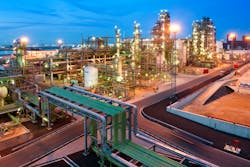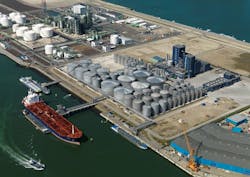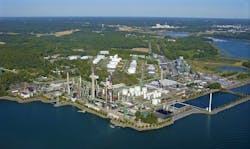Neste targets mid-2030s shift to 100% renewables refining
In late-2020, Neste Corp. launched a plan to restructure its refining operations in Finland as part of the operator’s strategy to ensure long-term competitiveness of its oil products business amid declining demand for petroleum-based products. Acknowledging the program would require increasing the share of renewable energy solutions, Neste proposed modestly expanding existing renewable fuels production plants at the Port of Rotterdam and Singapore, as well as gradually transforming its remaining conventional crude oil refinery in the Kilpilahti industrial area of Porvoo, Finland, to increased coprocessing of renewable and circular raw materials.
Based on a commitment to achieve carbon neutrality in its global production by 2030 in line with the global energy transition, Neste had accelerated its transformation plan by late 2022 to include a series of initiatives aimed at reducing its carbon footprint that—in addition to further capacity expansions and partnerships to increase renewable fuels production—involve implementing 100% renewable electricity, green hydrogen production, carbon capture and storage (CCS), increased renewable feedstock pretreatment capability, and chemical recycling to create renewable feedstocks for production of fuel and petrochemicals. The revised plan now also considers reconfiguring the Porvoo refinery during the next decade to eliminate crude oil processing at the site.
This article provides an update on Neste’s ongoing projects to expand production of renewable fuels and presents an overview of its longer-term projects aligned with attaining carbon neutrality in accord with global climate goals.
Renewable refining expansions, partnerships
In June 2022, Neste reached final investment decision (FID) to move forward with a proposed €1.9-billion expansion of its Rotterdam renewable fuels refinery (Fig. 1). Currently under way, the project will increase Neste’s current 1.4-million tonne/year (tpy) renewable product capacity at the site to 2.7 million tpy, of which 1.2 million tpy will be sustainable aviation fuel (SAF).
Technip Energies will provide engineering, procurement services, and construction management (EPsCm) on the Rotterdam expansion, for which the service provider also delivered front-end engineering design (FEED) in 2021. The project includes implementation of Neste’s proprietary NEXBTL technology to enable flexible refining of a wide range of lower-quality renewable waste and residues into finished renewable diesel, SAF, and renewable feedstock for polymers and chemicals.
Neste’s FID for Rotterdam followed the operator’s late-2020 purchase of Bunge Ltd. subsidiary Bunge Loders Croklaan JV’s sustainable plant-based specialty oils and fats refinery in Rotterdam. Neste will use the acquired plant to increase pretreatment capacity of complex waste and residue feedstocks to support future expansions of the regional production platform (Fig. 2).
In late-October 2022, Neste confirmed it was nearing mechanical completion of a now €1.65-billion project to expand production of renewable products at its 1.3-million tpy renewable diesel refinery in Singapore (Fig. 3). On schedule for startup by end first-quarter 2023, the 1.3-million tpy expansion at Singapore also will enable the plant to produce as much as 1 million tpy of SAF based on market demand.
In addition to advancing capacity expansion for renewables at its existing operations in Europe and the Asia Pacific, Neste also has partnered with US-based Marathon Petroleum Corp. (MPC) to become equal partners in MPC’s Martinez Renewable Fuels (MRF) project to transform the now-idled Martinez, Calif., refinery into a renewable fuels production site. As part of the September 2022 transaction, MPC and Neste officially formed Martinez Renewables, a 50-50 joint venture partnership under which Neste joins the MRF with a total investment of $1 billion, inclusive of half the project’s estimated $1.2-billion total development costs through completion.
While MPC will continue to manage project execution and operate the renewables plant, the partners will equally be responsible for feedstock sourcing, as well as evenly share annual production output from the site. Slated for mechanical completion by yearend 2022, the MRF’s first phase is scheduled to begin production of 260 million gal/year of renewable diesel in early 2023, with pretreatment capabilities to come online in second-half 2023 before reaching full nameplate production capacity of 730 million gal/year (2.1 million tpy) by yearend.
By late 2023, Neste said production from MRF alongside startup of the Singapore expansion will increase its total production capacity of renewable products to 5.5 million tpy. Following commissioning of the Rotterdam refinery expansion during first-half 2026, Neste’s combined renewables production capacity will climb to 6.8 million tpy.
Porvoo refinery transformation
As part of a restructuring program for its Finnish refining operations announced in late 2020, Neste revealed it would permanently shutter its 58,000-b/d Naantali refinery and transform it into a terminal and upgrade the 10.5-million tpy Porvoo refinery to coprocessing renewable and circular raw materials, reducing the site’s dependence on traditional crude feedstock.
By late 2021, however, Neste’s revised plan for its conventional Porvoo refinery expanded to include additional decarbonization measures, which by yearend 2022 outlined a potential crude-free future for the site.
In September 2022, Neste launched a strategic study on transitioning the Porvoo refinery to an entirely renewable and circular site, which would include eliminating all crude processing at the platform in the mid-2030s. The proposed transformation would initially involve coprocessing of both renewable and circular feedstock and, at a later stage, could include retrofitting of existing conventional units for a long-term potential of 2-4 million tpy in renewables production capacity.
While Neste acknowledged the transformation would require major investments during the next decade, the operator said the project would be based on modularity and flexibility, allowing adjustments to reflect variations in the pace of change in both the renewable and circular businesses as well as in traditional refining. Details regarding completion of the study or a proposed timeline for FID on the project have yet to be revealed.
Additional projects, initiatives
Alongside projects to expand production of renewable fuels, Neste is advancing projects designed to further reduce Porvoo’s overall carbon footprint.
In November 2021, the operator received €88 million in funding from the European Union (EU) Innovation Fund to implement a renewable hydrogen and carbon dioxide (CO2) CCS project at Porvoo. The project will introduce CCS and electrolysis technology solutions enabling the refinery to decarbonize production processes as part of a broader plan to transform the site into a European hub for renewable hydrogen and CO2 utilization.
Aligned with Neste’s target to achieve carbon neutral production at its operations by 2035 and supporting both Finland’s and the EU’s climate targets in step with the European energy transition, Neste said the proposed Porvoo CCS and renewable hydrogen project aims to reduce CO2 emissions at the site by more than 4 million tonnes during the first 10 years of operation.
In December 2022, Business Finland also awarded Neste €27.7 million in public funding to support Porvoo’s future green hydrogen projects following the July 2022 designation of its Project PULSE (Pretreatment and Upgrading of Liquefied waste plastic to Scale up circular Economy) by the European Commission as an Important Project of Common European Interest (IPCEI) Implementing Neste’s proprietary technologies for chemical recycling of waste plastic for gradual integration into Porvoo’s refining operations, PULSE—which is scheduled for startup in January 2028—will enable the site to process 400,000 tpy of liquefied waste plastic to avoid CO2-equivalent emissions of 10.3 million tpy during its first 10 years of operation, Neste said.
In December 2022, Neste confirmed it had partnered with Norway-based hydropower producer Statkraft and wind farm developer Ilmatar to help transition its operations to a more sustainable energy supply via deliveries of renewable wind power to the Porvoo refinery. Statkraft began supplying the site in August 2022, with deliveries from Ilmatar scheduled to begin in early 2023. Together, Statfraft and Ilmatar will supply about 290 Gw-hr/year of renewable electricity. Combined with an existing power purchase agreement with Fortum, Neste said renewable wind power will account for about 40% of the refinery’s electricity usage by 2025.
About the Author
Robert Brelsford
Downstream Editor
Robert Brelsford joined Oil & Gas Journal in October 2013 as downstream technology editor after 8 years as a crude oil price and news reporter on spot crude transactions at the US Gulf Coast, West Coast, Canadian, and Latin American markets. He holds a BA (2000) in English from Rice University and an MS (2003) in education and social policy from Northwestern University.




